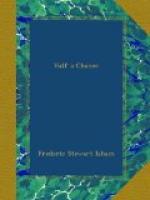The effect was instantaneous, magical; Lord Ronsdale sprang to his feet; John Steele looked at him, at the wavering face, the uncertain eyes. No doubt existed now in his mind; Gillett had not secured the paper, or he would have given it to his patron when they were alone. That fact was patent; the document was gone, irretrievably; there could be no hope of recovering it. The bitter knowledge that it had really once existed would not serve John Steele long. But with seeming resolution he went on: “I had the story from his own lips,” deliberately, “put in the form of an affidavit, duly signed and witnessed.”
“You did?” Lord Ronsdale stared at him a long time. “This is a subterfuge.”
“It is true.”
“Where—is the paper?”
“Not in my pocket.”
The other considered. “You mean it is in a safe place?”
“One would naturally take care of such a document.”
“You did not have any such paper at Strathorn.”
“No?” John Steele smiled but he did not feel like smiling. “Not there certainly.”
“I mean no such paper existed then, or you would have taken advantage of it.”
John Steele did not answer; he looked at the drawer. The affidavit was not there; but something else was.
“You are resourceful, that is all.”
Lord Ronsdale had now quite recovered himself; he sank back into his chair. “You have, out of fancy, constructed a libelous theory; one that you can not prove; one that you would be laughed at for advancing. A cock-and-bull story about a witness who was not a witness; a paper that doesn’t exist, that never existed.”
A sound at the door caused him to turn sharply; a knocking had passed unheeded. The door opened, closed. Mr. Gillett, a troubled, perturbed look on his face, stood now just within. “Your lordship!”
“Well?” the nobleman’s manner was peremptory.
The police agent, however, came forward slowly. “I have here something that one of our men has just turned over to me.” John Steele started; but neither of the others noticed. “He found it at the last place we were; evidently it had been dropped by the fellow who was there and who fled at our coming.” As he spoke, he stepped nearer the desk, in his hand a paper.
“What is it?” Lord Ronsdale demanded testily.
Mr. Gillett did not at once answer; he looked at John Steele; the latter stood like a statue; only his eyes were turned toward the nobleman, to the thin aristocratic hand yet resting on the edge of the drawer.
“If your lordship will glance at it?” said Mr. Gillett, proffering the sheet.
The nobleman did so; his face changed; his eyes seemed unable to leave the paper. Suddenly he gave a smothered explanation; tore the sheet once, and started up, took a step toward the fire.
“Stop!” The voice was John Steele’s; he stood now next to the partly-opened drawer, in his hand that which had been concealed there, something bright, shining. Lord Ronsdale wheeled, looked at the weapon and into the eyes behind it. “Place those two bits of paper there—on the edge of the desk!”




